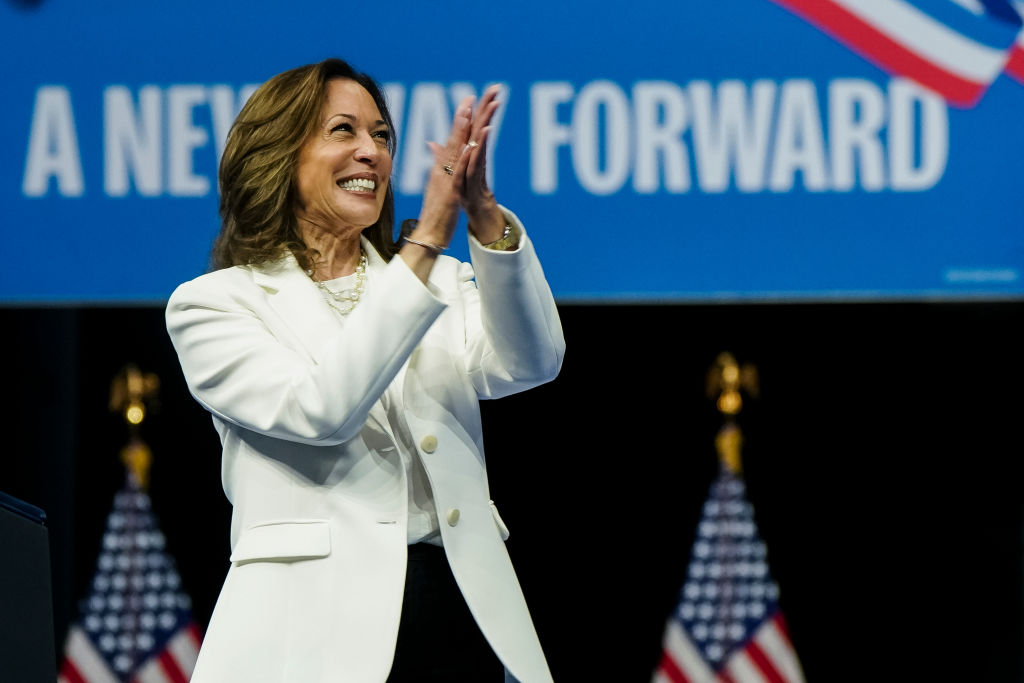Last night, Kamala Harris and Tim Walz sat down with CNN’s Dana Bash for their first interview since accepting the Democratic nominations for president and vice president. The 22-minute exchange, conducted on a campaign bus in Georgia, was a curious affair: in parts a policy discussion, an attempt to humanise the candidates, and an awkward dance around Harris’s evolving positions on key issues.
The Vice President’s responses on fracking — a third rail in the critically important purple state of Pennsylvania, where many jobs depend on it — exemplified her delicate balancing act. When pressed about her 2019 statement supporting a ban, Harris pivoted: “No, and I made that clear on the debate stage in 2020, that I would not ban fracking. As Vice President, I did not ban fracking. As President, I will not ban fracking.”
This abrupt reversal seemed forced, especially given Harris’s attempt to retroactively clarify her position by referencing the 2020 vice-presidential debate. However, a review of that debate transcript reveals no such clarification occurred. Harris merely stated then that Joe Biden would not ban fracking, without addressing her own stance.
The fracking exchange highlighted a recurring theme: Harris’s efforts to distance herself from her more progressive past positions while maintaining her liberal bona fides. On immigration, she touted her work addressing the “root causes” of migration from Central America, while also emphasising her support for increased border security. “I’m the only person who has prosecuted transnational criminal organisations who traffic in guns, drugs, and human beings,” she noted, eager to burnish her law-and-order credentials a few years after claiming she was open to rethinking the funding structure for law enforcement.
This careful repositioning extended to economic issues as well. Harris defended the administration’s record on inflation and job creation, while acknowledging persistent affordability concerns. Her “opportunity economy” proposals — including an expanded child tax credit and first-time homebuyer assistance — seemed calibrated to appeal to struggling middle-class voters without alienating the Democratic base.
Throughout the interview, there was a palpable effort to humanise Harris, who in past elections came across as stiff and unlikeable on the campaign trail and behind the scenes. She shared an anecdote about making pancakes for her nieces when Biden called to tell her he was withdrawing from the race. Even in these more personal moments, however, Harris appeared somewhat ill at ease, her responses feeling rehearsed rather than spontaneous.
Walz, for his part, was largely superfluous to the proceedings. When asked about his prior claim of carrying weapons in war despite never deploying to a war zone, the Minnesota Governor fumbled through a non-answer. “Well, first of all, I’m incredibly proud. I’ve done 24 years of wearing the uniform of this country,” he said. “Equally proud of my service in a public school classroom, whether it’s Congress or the governor.” He added: “I think people are coming to get to know me. I speak like they do. I speak candidly. I wear my emotions on my sleeves, and I speak especially passionately about our children being shot in schools and around guns.”
This rambling response, which pivoted awkwardly from his military record to school shootings, did little to clarify the discrepancy or bolster the ticket’s national-security credentials. Walz’s attempts to highlight deployments to Italy and Norway rather than combat zones only served to underscore the oddity of his selection as running mate when more attractive purple-state options, such as Pennsylvania Governor Josh Shapiro, were available.
The sit-down wasn’t a disaster: Harris and Walz came across as earnest and well-meaning, if not particularly dynamic. But it also did little to quell lingering doubts about her readiness for the presidency or her ability to connect with voters on a personal level. More concerning for Democrats should be Harris’s apparent reluctance to stake out bold policy positions. When it came to foreign policy, she reaffirmed unwavering support for Israel while calling for an end to the war in Gaza, but offered no specific proposals for achieving that goal. Her refusal to consider withholding arms shipments to Israel — a step advocated by many progressives — highlighted the tightrope she is walking between different factions of the Democratic coalition.
Perhaps the most revealing moment came when Bash asked Harris if she had any regrets about defending Biden’s capacity to serve another term. “No, not at all,” she replied, before praising the President’s intelligence and commitment. Left unaddressed was why, if Biden was so capable, he chose to withdraw from the race in the first place.
Harris and Walz seem to be operating under the assumption that a cautious, do-no-harm approach is their surest path to victory in November. Given their current narrow lead in the polls, that may well be true. But elections aren’t won solely by playing defensively. At some point, Harris will need to make a more compelling case for why she — rather than just any generic Democrat — should be the next president. Both she and Walz need to get out of their comfort zone, engage with tougher questioning, and develop more substantive responses to the myriad challenges facing the nation. Last night’s interview suggests they’re not quite there yet.











Join the discussion
Join like minded readers that support our journalism by becoming a paid subscriber
To join the discussion in the comments, become a paid subscriber.
Join like minded readers that support our journalism, read unlimited articles and enjoy other subscriber-only benefits.
Subscribe